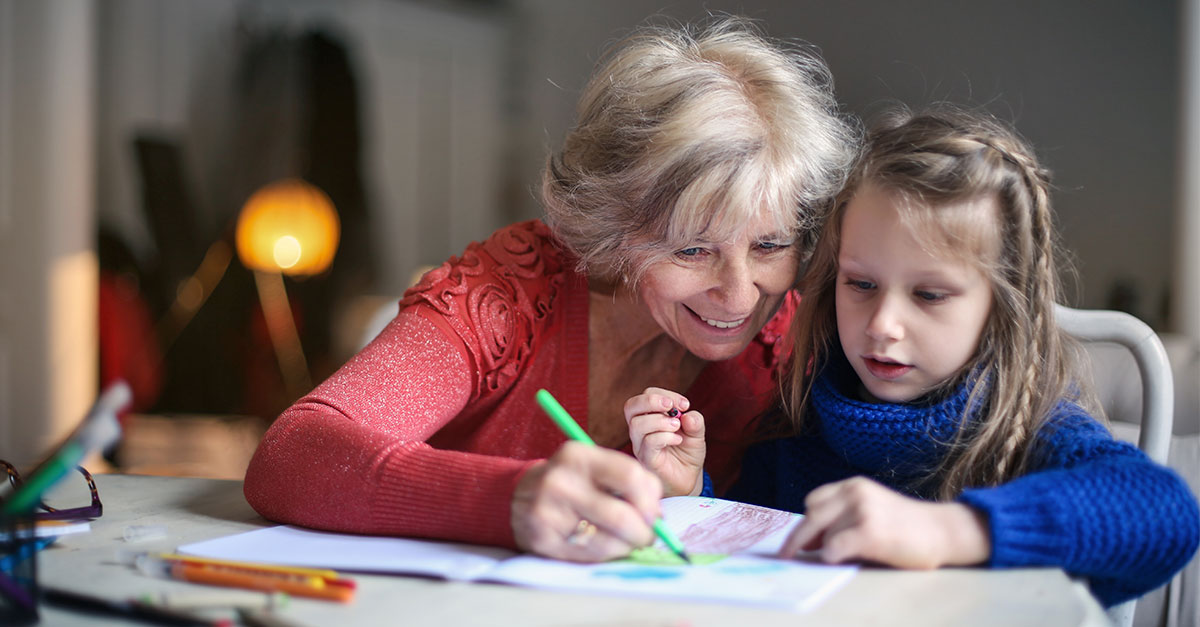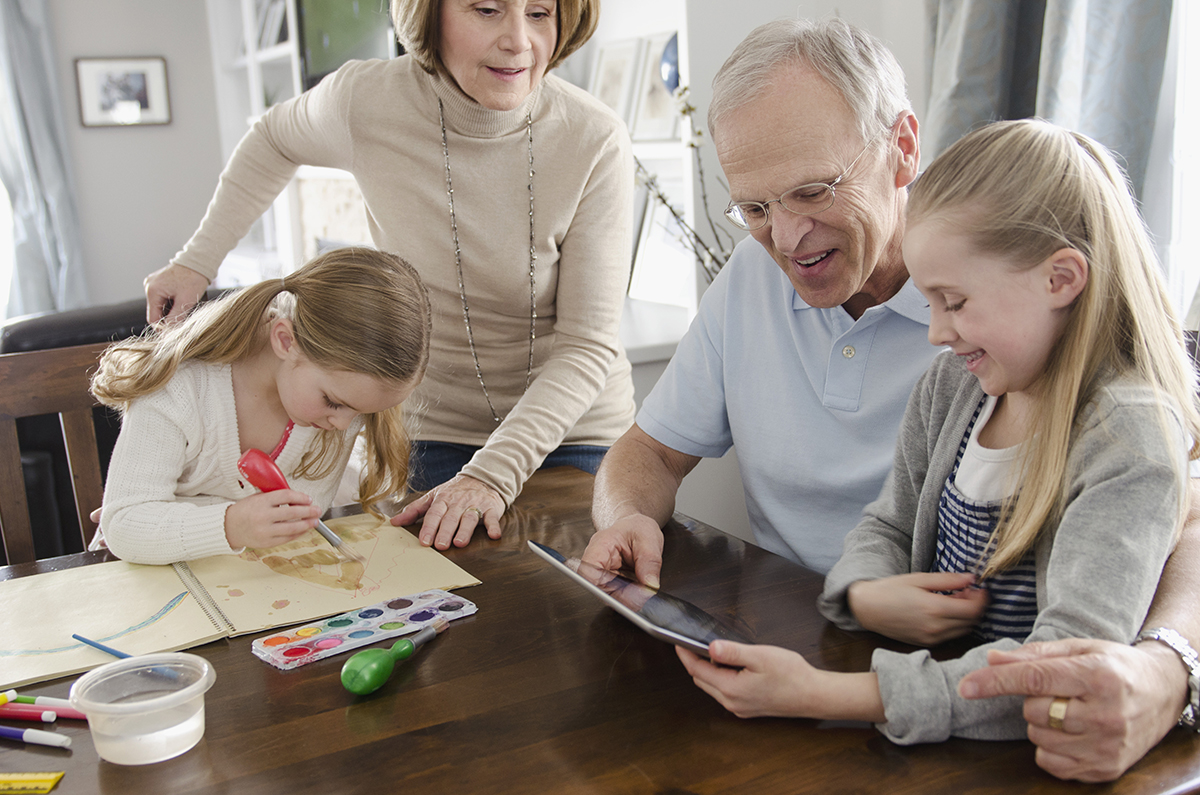The Importance of Intergenerational Learning for Young & Old

Grandparents are important and so is intergenerational learning. In the busy society we live in, intergenerational learning is often minimal or even absent.
Grandpa Joe’s relationship with Charlie in the book and movie Charlie and the Chocolate Factory perfectly captures that special bond between grandparent and grandchild. The story is also a wonderful illustration of how grandparents can impart wisdom to their grandchildren. In the story, Grandpa Joe teaches Charlie about faith, hope, and the power of imagination.
3 Reasons Why Intergenerational Learning is Important
1) Broadens Our Understanding of the World
Intergenerational learning broadens our knowledge base beyond our own personal experience and gives us a broader historical context for understanding our world. This is something deeply felt and understood in cultures that revere the elderly for their wisdom. The pop-culture image of a young Native American warrior seeking advice from the wise old chief or the feeble old woman may seem cliche but it speaks to the inner desire for a connection to our past. (Even Luke Skywalker needed counsel, which is why he turned to Obi-Wan Kenobi, who turned to Yoda, who was about as ancient and wise as you can get.)
2) Helps People Understand the Commonality of the Human Experience
Intergenerational learning helps people understand the commonality of the human experience. It also reveals the true rate of change, which is most often very slow. Love, sorrow, laughter, and tears are all common to the human experience. Grandpa Joe may have gone on a date at the local soda shop, not a Starbucks, but you can bet that he was just as nervous about asking the girl out as his grandson. Understanding our common humanity is a critical role in cultivating empathy and the ability to love fully and deeply.
3) Helps Older Generations Understand Young Generations
Intergenerational learning helps the older generations realize that the younger generations are, in many ways, just like them. It helps provide assurance that, contrary to public opinion, each new generation is not spiraling down into the depths of depravity. Actually, while there are differences in the ways that each generation manifests its humanity, each generation is no better and no worse than the generations before it; human nature and the human experience are constant in an ever-changing world.
Charlie learned a lot from Grandpa Joe in Roald Dahl’s classic story, but it is also true that Grandpa Joe learned a lot from Charlie. Grandpa Joe was a little rough around the edges and a little jaded and cynical; Charlie taught his grandpa to believe in people, to empathize and be forbearing, and to be unselfish. It is true that grandparents can teach their grandkids but it is equally true that those grandkids can teach their grandparents; intergenerational learning is a two-way street.

Story Time: Intergenerational Learning with My Grandmother
My grandmother was a school teacher who possessed a passion for learning and loved history. Growing up, my family would go on trips with my grandparents to Colonial Williamsburg. My grandmother wanted to see and experience everything and would make sure we all experienced and learned as much as possible on each trip. We would walk down the streets and see the people in their 18th-century garb. My grandmother would share stories about that time period, introducing us to the key people, events, and ideas from history.
All these years later, I still remember how meaningful this time with my grandmother was and her ability to make history come alive. My grandmother’s engagement in my learning has had a significant effect on my life and helped create a love of history and learning.
It is important for kids to interact with their grandparents. Not only does developing a relationship with grandparents strengthen the emotional support system for the child, but it also allows our children to learn from people even older and wiser than ourselves. Grandparents who are engaged in their grandchildren’s learning can help inspire them to read, study, and explore.
Wisdom often increases with age. In many cultures, the elderly are revered and looked to for insight and advice. Encouraging and facilitating strong relationships between grandparents and grandchildren is a great way to enhance our children’s education while exposing them to the wisdom of our parents who have more experiential knowledge than we do.
The presence of a grandparent confirms that parents were, indeed, little once, too, and that people who are little can grow to be big, can become parents, and one day even have grandchildren of their own. So often we think of grandparents as belonging to the past; but in this important way, grandparents, for young children, belong to the future.
Fred Rogers

Intergenerational Learning Insights from Research Studies
In March, 2014, I attended a forum hosted in Lancaster, Pennsylvania by the Sesame Workshop that addressed a number of themes, including the importance of grandparents in childhood education.
Intergenerational learning is a topic that is drawing the attention of educators as grandparents are becoming more and more active and engaged in the lives of their grandchildren.
According to an AARP survey, the average age of a first-time grandparent is 47. 90% of the grandparents surveyed indicated that their role as a grandparent is an important one. While “spoiling the grandkids” ranked at the top of the job description of a grandparent, survey responders also indicated that teaching their kids family history is a very important part of their role.
Grandparents aren’t just telling silly jokes these days. More than half report conversations with their grandchildren include meaningful topics such as morals and values (78 percent), religion and spirituality (66 percent), and illegal drugs and alcohol (50 percent.) Even 37 percent talk about dating or sex with at least one of their grandchildren. They also talk about key issues such as staying safe (73 percent), peer pressure and bullying (53 percent), and health/obesity (61 percent.) Almost half (45 percent) talk about issues their grandchildren have with their parents. A grandparent can be the caring adult who loves unconditionally and provides that listening ear that all kids need, which helps shape who they become as adults.
Today, more than 51.4 million – 1 in 6 – Americans live in a multigenerational household.
Surprisingly, Hawaii had the highest percentage of multigenerational family households, 8.3 percent of all households. Minority families provide an interesting case study when it comes to intergenerational learning.
According to Pew Research, “Among racial and ethnic groups, black children are the most likely to be cared for primarily by a grandparent—8% are, compared with 4% of Hispanics, 3% of whites, and 2% of Asian children.”
3 Main Reasons for Multigenerational Households
1) Financial Pressures
2) Situational Circumstances
3) Cultural Influences
All this research serves to illustrate modern trends that indicate a growing level of involvement of grandparents in the lives of their grandchildren.
As we watch the modern family become more and more diversified, it’s easy to forget the foundation of family: relationships built on trust and reciprocated love. Whether it’s a traditional family or one of multicultural and intergenerational bonds, the importance of empathetic connection and relationship remain the same.
Increased grandparent involvement may bring with it certain challenges, but it also presents great opportunities for personal enrichment and the growth of each individual family member as well as the extended family as a whole.
3 Practical Tips for Intergenerational Learning
The grandparent-grandchild bond is generally very strong and can often provide opportunities for learning to occur. Here are some tips for encouraging intergenerational learning.
1) Create Opportunities for Interaction
Our lives are often busy and despite our best intentions, we can often forget to make time for extended family. Scheduling visits to “grandmother’s house,” gathering together for holidays, and getting together to celebrate birthdays are just a few of the many ways to create opportunities for your kids to interact with their grandparents. For families that live in close enough proximity, asking your parents to babysit your kids can be another great opportunity to grow that bond.
2) Ask for Their Advice
We as parents can learn from the advice, wisdom, and insight of our own parents who often have much more experience parenting than we ourselves do. In addition, this wisdom and experience can also benefit our kids. And during the teenage years when teens may not be as open or accepting advice from their parents, they are often more receptive to the advice given by their grandparents. Bear in mind that how we treat our parents will influence how our children treat us when they become adults. If we respect, honor, and cherish our parents, our kids will be more likely to respect, honor, and cherish us.
3) Have Your Kids Explain Technology
Most kids growing up today are quite adept at using technology. Whether it’s the latest smartphone, tablet, or iPod, our kids know how to operate all those fancy gadgets. The great thing about asking kids to help teach their grandparents how to use technology is that it makes them feel like technology ‘experts’ and validates their knowledge and skillfulness. Many grandparents would welcome helpful instruction especially if it meant having the chance to spend some quality with their grandkids.
One of the best gifts we can give our children is the opportunity to spend time with their grandparents. Strengthening the bonds of family is rewarding for everyone and creating memories with loved ones is an opportunity to bring joy and happiness into our lives and the lives of our children.
Related Blog Post
Amidst Pandemic School Craziness, Many Grandparents Are Eager to Help